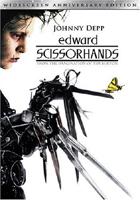 BUY IT AT AMAZON: CLICK HERE!
BUY IT AT AMAZON: CLICK HERE!
STUDIO: 20th Century Fox
MSRP: $14.98
RATED: PG-13
RUNNING TIME: 105 Minutes
SPECIAL FEATURES:
• Commentary by director Tim Burton
• Commentary by composer Danny Elfman
• Behind-the-scenes featurette
• Trailers and TV spots
There’s a
fairly major caveat to get out of the
way before this review begins. This is not a new edition of Edward
Scissorhands. The disc and packaging are identical to the 10th
anniversary release in 2000. The only thing that has changed is that this new anniversary
edition has a cardboard slipcover to distinguish it from the old edition.
Having
said that, at least Fox isn’t trying to ding you with a double-dip if you
already have the 10th anniversary disc; and it’s bargain-priced, so they’re not
trying to slip one under the ol’ radar, either. What they’re offering is just another
chance to pick up a near-classic movie. (There’s probably something cynical
having to do with marketing and money, too, but I studied English and am
gullible.) The unfortunate side-effect is that quibbles with the quality of the
first disc have not been addressed, and some of the features haven’t aged well.
The Flick
The story
of Edward
Scissorhands is a cinch: take one part Frankenstein’s monster, then
give a damn about the monster’s feelings, and there you go. It’s a model that
has worked for a number of other stories in the past (King Kong and Frankenstein
itself, for example), but in 1990 it hadn’t been done for a while, so director
Tim Burton stepped up to give it a shot. His monster is a quirky, modern
parallel to our historic literary monsters: a mental child with a decent heart,
the capacity for great evil, and an underdeveloped sense of morality.
The
internal conflict in any monster story centers around the question of whether
or not the monster will adopt an acceptable code of ethics, or if his
inhumanity (real or imagined) will drive him to destruction.
centers into the suburbanite parents who adopt Edward, played by note-perfect
Dianne Wiest and Alan Arkin. The role of the love interest was filled by Winona
Ryder, the young girl who manages to dig past her not inconsiderable prejudices
to fall for Edward. The most successful, apart from Depp as Edward himself, are
the various faces that make up the minor society of the suburban setting — the
nosy, partial, short-tempered, reactionary neighbors. They’re the ones who,
from frame one, you can imagine waving their pitchforks.
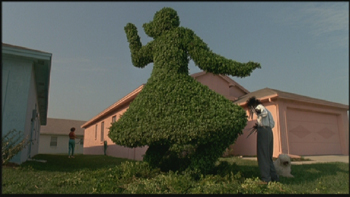
It’s called "Rorschach in Green". I can see a duck with speedy legs.
With all
these tropes presented with little veneer, there was a real danger that the
film would have trouble handling the character progression with any subtlety or
delicacy. As many fans can attest, though, this is not a film that bludgeons
its viewers with its cautionary moral. In fact, in the end it sacrifices the
lasting impression of being a Grimm tale in favor of a sequence that’s pure
romance. The message seems to be that the heritage of the film is just another
one of its dark jokes, and you’re poorer, but not destitute, for missing it.
It would
be a mistake for me to praise the film impartially for its subtlety, however.
Fantasy doesn’t work as well when it’s subtle; it needs spectacle, in any
fashion it can find it. This is because fantasy is our literature’s best method
of exaggerating ideals and concepts. (Arguably, all exaggeration is fantasy.) Exaggerations
are, by nature, unsubtle. The tension between the blatant and the subtle is one
of the arresting features of Edward Scissorhands; it’s the sort
of movie that grows on you upon reflection, as your brain is given time to
synthesize the structure, spectacle, and dialogue.
There is
a similar tension between the humor and the drama. This is a Tim Burton film,
so there are sight-gags a-plenty, and sections of pure physical comedy. All of
it has a dark tone, which tends to slide naturally into the drama, which is
likewise of a dour nature. Edward’s flaw and failing occur on the small scale,
but the explosions of conflict that build from them are cataclysmic because
they remove even that small world from Edward. The humorous fantasy and
fantastic drama don’t often sit side-by-side; there’s a slide from the former
to the latter as the movie goes on, but neither feels at all out of place.
This is
partly due to Johnny Depp’s fantastic physical performance. Edward doesn’t get
many lines, and the ones he gets are pretty slim on the inherent emotion. Depp
imbues every little, mumbled "thank you" with a definite emotion. For
all his blankness and mystery, Edward is a highly emotional creature, and Depp
gives him just the right childlike quality that suggests Edward himself is
unsure of the reasons for his emotion, but is definite on how they feel. He
handles the physical aspect of the role masterfully, too, with not a comedic
beat missing, nor an angry slump of the shoulder out of place.
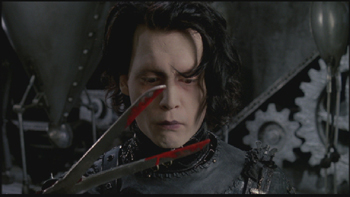
My deep soul is red; my deep soul is near my duodenum.
Depp
makes Edward Scissorhands a wholly sympathetic monster, and without his
performance, or a comparable one, this movie would not have been possible. It’s
vital that Edward be instantly memorable, in his look and his actions, in part
to distinguish him from other literary monsters, and in part cross the gap of
suspension of disbelief.
Edward Scissorhands is an internally conflicted work,
but for its successful revision of familiar archetypes, its uniqueness, its
Vincent Price, and its willingness to resolve its own contrasts through
characters that undergo significant change, it deserves a place as a minor
classic.
It also
deserves a new, tricked-out DVD release.
8.5 out of 10
The Look
in 1.85:1 anamorphic widescreen. The choice to set a fairy tale in such an
antiseptic world pays off well in the contrast with the inventor’s mansion, and
both visual styles are presented well. The clarity is what you might expect
from a release that’s five years old — in other words, it’s good but not
great. The color depth is big on vibrancy, but small on range, specifically
when it comes to the blacks, which are tinted more blue than an audience might
prefer. Fox did a decent job the first time around and, not having any glaring
flaws to fix, they left it alone for this re-release.
7 out of 10
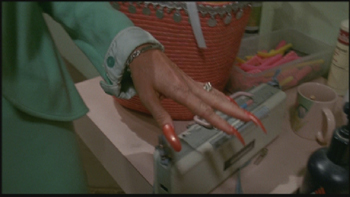
Pleasant dreams.
The Noise
This
aspect of the disc takes the biggest hit from its dated release. It features a
4.0 surround, which is just superfluous, and a Dolby Surround, which is a good
deal better. In neither track, though, is the bass well-represented. The whole
tone of the film is subtly affected by this lack, and the result is somewhat
thin. It’s the most noticeable sign of age (apart from the occasional hairstyle),
which I suppose should be taken as much as a compliment as a criticism.
6 out of 10
The Goodies
The
showing here is a little sparse. There are two commentary tracks, one by
director Tim Burton, and the other by composer Danny Elfman.
interesting guy with a good vision, but he seems self-conscious, distracted,
and bored on this track. His anecdotes are rambling, and occasionally have no
connection to the images on the screen; also, he often loses his train of
thought and falls into silence without completing a sentence. It’s damn near
infuriating.
Elfman is
a bit more informative, and also more fun. His track doesn’t just concern the
creation of the score, but also the other aspects of the filmmaking that he
came in contact with during production. He also has a few personal anecdotes
that do what a commentary track ought to: simultaneously inform and entertain.
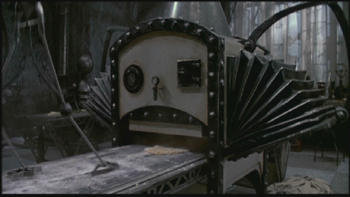
My wife won’t let me draw a little face on our mailbox.
"But honey," I say. "Vincent Price was allowed to do it!"
Then she reminds me, once again, that I am not Vincent Price.
There’s a
bonus mysteriously listed in all the literature as "Featurette" that
is a quick behind-the-scenes deal, which was obviously touched by the hand of
marketing dweebs.
Other
than that, you get the original theatrical trailer, a few TV spots, and — get
ready for this — interactive menus.
Really, I never once understood the motivation for labeling one’s menus
"interactive". Doesn’t a menu have
to be interactive, by nature?
6 out of 10
The Artwork
The new
slipcover is an arresting image, stark black-on-white except for the spot of
color provided by the butterfly. It’s simple, but compared with the original
keep-case artwork which featured a large portion of environment that anchored
the image, it shifts the focus almost entirely onto Edward. Edward is so damn
close to being iconic that the chance just about works, but I still hear people
in the aisles of video stores giving WTFs and brushing the movie aside based on
the unusual character design. Their loss, I guess. For a fan, this artwork is
great.
8 out of 10
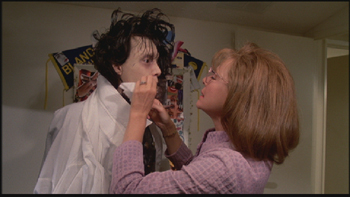
"Oh, darling, your worldwide tour begins right here in your bedroom!
You’ll always be a star to us."
Overall: 7 out of 10